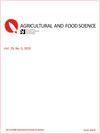集体代理作为多主体创新的杠杆点
IF 1.1
4区 农林科学
Q3 AGRICULTURE, MULTIDISCIPLINARY
引用次数: 0
摘要
本研究的目的是探讨园艺企业如何在创新系统内满足其创新需求。比较过程民族志方法应用于瑞典园艺学多个参与者之间长期合作的两个案例。通过文献记录和访谈对病例进行回顾性重建,以一种扎根的理论方法对数据进行三角测量。发现开发协同过程的杠杆点为;具有代理和网络方式,通过社会学习形成集体代理,增强资源获取和成果的可操作性。杠杆点的概念对于理解多参与者协作中的演化变化是有用的。集体代理概念的使用有助于理解需求表达的动态,说明行动者的个人代理之间的相互过程,并随着时间的推移通过他们的社会学习而演变。研究结果表明,决策者和实践者需要更广泛地理解行为体如何在创新系统中发挥作用,以加强知识发展和创新。本文章由计算机程序翻译,如有差异,请以英文原文为准。
Collective agency as a leverage point in multi-actor innovation
The aim of this study is to investigate how horticultural firms meet their need for innovation within the innovation system. A comparative process ethnography approach was applied to two cases of long-term collaboration between multiple actors in Swedish horticulture. The retrospective reconstruction of the cases through documentation and interviews allowed for triangulation of data in a grounded theory approach. The leverage points of the developing collaborative processes were found to be; having agency and a network approach, the forming of collective agency through social learning, enhancing resource access, and operationalization of results. The concept of leverage points is useful for understanding evolutionary changes in multi-actor collaborations. The use of the concept of collective agency contributes to the understanding of the dynamics of demand articulation, illustrating a reciprocal process between the actors’ individual agencies, and evolving over time through their social learning. The results point to a need for policymakers and practitioners to develop a broader understanding of how actors work in the innovation system to enhance knowledge development and innovation.
求助全文
通过发布文献求助,成功后即可免费获取论文全文。
去求助
来源期刊

Agricultural and Food Science
农林科学-农业综合
CiteScore
2.50
自引率
0.00%
发文量
22
审稿时长
>36 weeks
期刊介绍:
Agricultural and Food Science (AFSci) publishes original research reports on agriculture and food research related to primary production and which have a northern dimension. The fields within the scope of the journal include agricultural economics, agricultural engineering, animal science, environmental science, horticulture, plant and soil science and primary production-related food science. Papers covering both basic and applied research are welcome.
AFSci is published by the Scientific Agricultural Society of Finland. AFSci, former The Journal of the Scientific Agricultural Society of Finland, has been published regularly since 1928. Alongside the printed version, online publishing began in 2000. Since the year 2010 Agricultural and Food Science has only been available online as an Open Access journal, provided to the user free of charge. Full texts are available online from 1945 on.
 求助内容:
求助内容: 应助结果提醒方式:
应助结果提醒方式:


